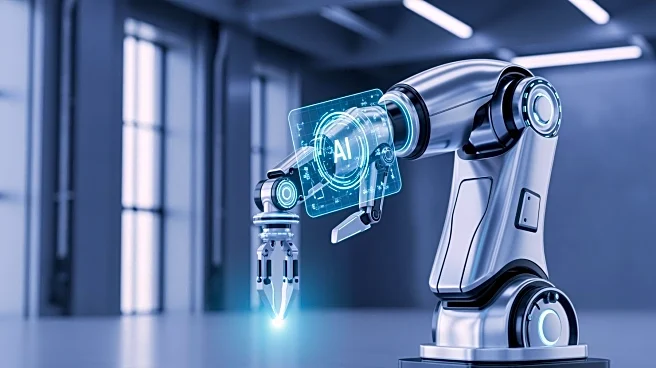What's Happening?
Rivian has announced the creation of Mind Robotics, a new spin-off focused on integrating artificial intelligence with robotics in manufacturing. This marks Rivian's second spin-off this year, following the launch of Also Inc. in March. Mind Robotics aims
to leverage Rivian's operational data to enhance industrial processes through AI-driven robotics. The company has secured approximately $110 million in seed funding, although specific details about its operations remain limited. The trademark application for Mind Robotics was filed with the U.S. Patent and Trademark Office, indicating potential broad applications across various sectors.
Why It's Important?
The launch of Mind Robotics highlights Rivian's strategic move to capitalize on the growing demand for AI and robotics in industrial applications. This initiative could significantly impact manufacturing efficiency and innovation, potentially setting a precedent for other companies in the transportation technology sector. By focusing on AI-driven solutions, Rivian is positioning itself as a leader in the integration of advanced technologies in industrial settings, which could lead to increased competitiveness and market share. The investment in Mind Robotics reflects a broader trend of companies seeking to enhance operational capabilities through technological advancements.
What's Next?
While Rivian has not disclosed specific plans for Mind Robotics, the company is expected to provide further updates on its development and applications. The potential transfer of Rivian employees to Mind Robotics could indicate a strategic realignment of resources to support this new venture. As the industrial AI and robotics sector continues to evolve, Rivian's initiative may prompt other companies to explore similar opportunities, potentially leading to increased collaboration and innovation in the field.
Beyond the Headlines
The establishment of Mind Robotics raises questions about the ethical implications of AI in industrial settings, particularly concerning job displacement and the need for regulatory frameworks to ensure responsible use of technology. As AI becomes more integrated into manufacturing processes, companies will need to address these challenges to maintain public trust and support.















